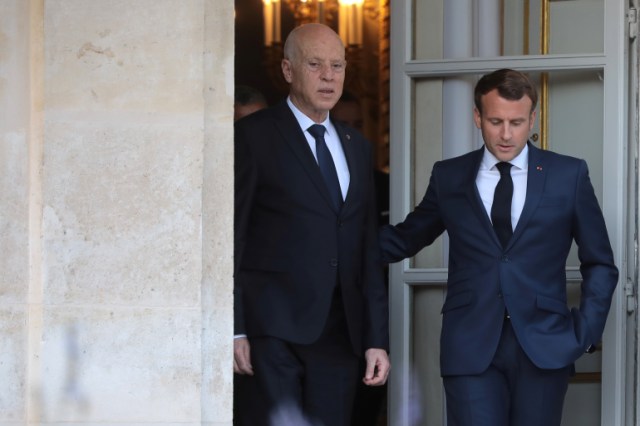The Tunisian governorate of Tataouine is witnessing protests and skirmishes between protesters and the security forces who used heavy tear gas and arrested a number of them, at a time when the government announced its understanding of the legitimacy of these moves.
The protesters accuse the government of renouncing previous agreements stipulating the employment of a number of the people of the region and the establishment of development projects in it.
Their demands ranged from demanding jobs that the government promised in 2017 to provide, to demanding the release of a number of detainees after skirmishes with the security forces, according to family testimonies.
On Tuesday, protesters gathered quietly in front of the city court, and large numbers of police officers were deployed, calling for the release of activist Tariq Haddad.
Counts and demands
Abdel-Aziz El-Ayeb, Haddad's lawyer, said that his client was charged with a number of charges, including "insulting a public official and participating in a gathering that affects public peace."
The lawyer added to Agence France-Presse that his client should appear in court on the second of next July, noting that he applied for his release.
Tataouine Governorate has been living in a state of congestion for days, against the backdrop of a sit-in carried out by a number of youth in the area.
A few days ago, security stopped the mourning during the breaking up of a sit-in of the camel movement, which included burning rubber tires and firing tear gas canisters.
A few days before that, they prevented oil companies' trucks and cars from passing into the desert in order to pressure the government to implement the full provisions of the Camor Agreement.
Daw al-Ghoul, coordinator of the Al-Kamour sit-in, told Al Jazeera that they had been waiting for a ministerial council to consider the problems of the people and the situation of the disadvantaged city of Tataouine for years. He continued: Our demands were employment and development, and now our main demand has been to release the detainees.
Congestion and accusations
For its part, the security establishment affirms that it does not want more congestion, but stresses the need to adhere to the peace movement.
This comes while the local authorities in the governorate of Tataouine say that they have implemented most of the demands of the protesters, and that they are completing the remainder of them in coordination with the central authorities, to overcome bureaucratic obstacles.
On the other hand, the protesters confirm the authorities' repudiation and delay in programming a special budget to establish development projects in the border state, which is rich in oil and gas.
These fortunes - say the people - revive the state budget, but they did not change the reality of the province, which records the highest unemployment rates in the country, in a paradox that was established after independence, and did not change after the revolution.
In June 2017, the government and representatives of protesters, in the Kamour region of Tataouine, concluded an agreement to break a sit-in that lasted for more than two months, at the time, in exchange for responding to demands for protests related to job creation and governorate development.
The protesters are demanding the completion of the employment of a thousand and 500 people in the oil companies, the employment of 500 others in the Environmental and Horticultural Company (specialized in landscaping the city entrances) and allocating an amount of 80 million dinars (about 32 million dollars) annually in the state's development fund.
Tataouine is rich in oil and gas, and national and foreign energy companies are spread in the nearby desert.
According to official figures, the Tataouine fields contribute 40% of the country's oil production, and 20% of gas production.
View and invite
In January, President Qais Said received activists from Tataouine, whose unemployment rate is 30%, twice the national average.
On Tuesday, the president said, "The security approach is not a solution. This could lead to other protests and hotspots."
During a visit to Paris, Tunisian demonstrators stopped Said's motorcade, saying "Tataouine, you are not giving up." The president offered them to receive representatives of the demonstrators at the presidential palace upon his return, according to a witness.
In an interview with "France 24" channel, Saeed called on the unemployed in Tataouine to "provide development projects" for the state.
According to the government, the cabinet will hold a special session on Friday on the situation in Tataouine.

